Body Image
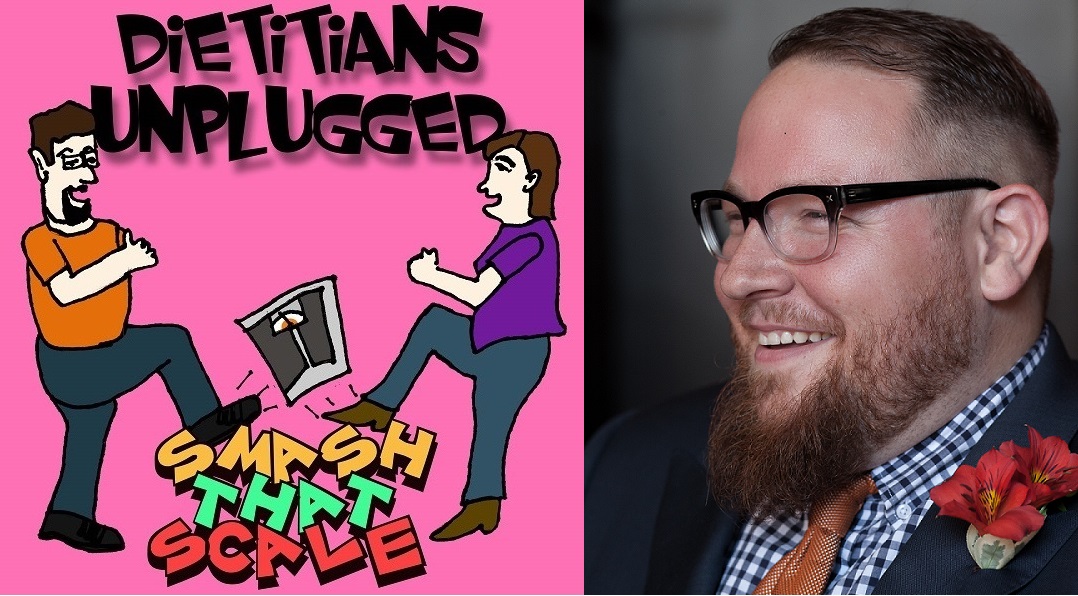
When I first began my body acceptance journey back in 2010, I started out looking at fat fashion blogs. One of those blogs I found was Chubstr.com. Since then, founder Bruce Sturgell has turned Chubstr into a comprehensive lifestyle site and invaluable resource for large men. Because fat guys should have great clothing too!
In this episode of Dietitians Uplugged, we chat with Bruce about why he founded Chubstr, two things everyone should do when they’re starting to figure out their own style, and some of the best places to find big men’s clothing right now.
Listen now:
Do you struggle with PCOS and your weight…but don’t want to diet ever again?

If you’ve been given the standard advice when it comes to Poly Cystic Ovarian Syndrome — which has traditionally been to lose weight — but never want to diet again and aren’t sure the best way to eat for your health and fertility, I have exciting news for you. My friend, registered dietitian Julie Duffy Dillon, has created a course that is 100% diet-free to help those suffering with PCOS, called Your Step-By-Step Guide to PCOS and Food Peace. Registration is open until January 31, so check it out now!
Subscribe and get my free guide:
Why you overeat …and what to do about it.
Click here if you just want my newsletter!
Body Image
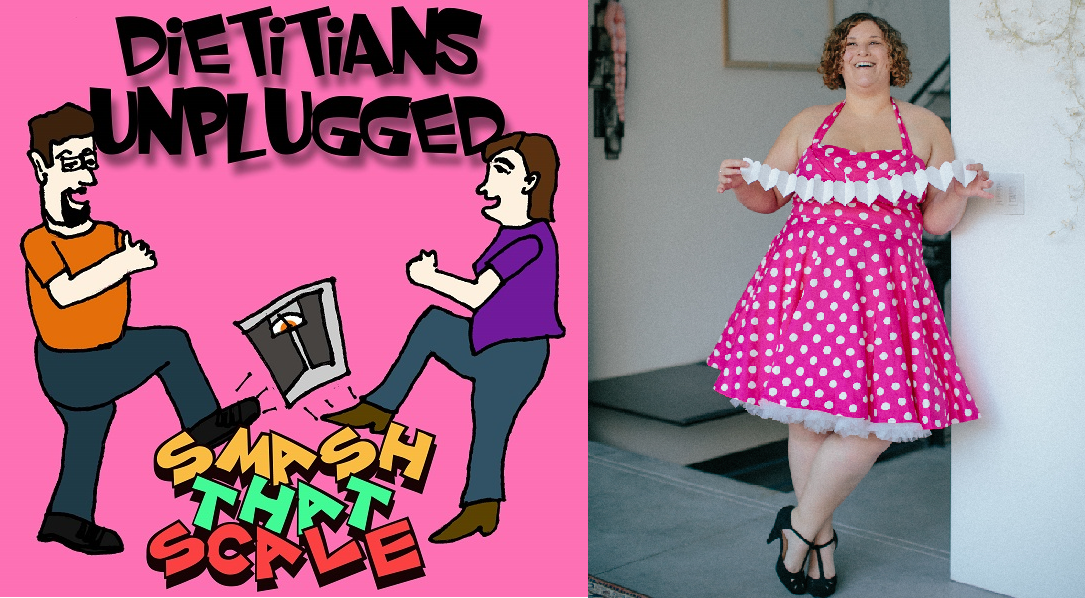
Let’s face it: finding love is not easy, and it can feel even harder – maybe even impossible – when you’re dating while plus-size in a fat-phobic world.
That’s why Aaron and I asked psychotherapist and dating expert Krista Niles to talk with us about the challenges of plus-size dating in this episode of Dietitians Unplugged. Krista gave us the goods on everything: dating profile photos, body image issues, dealing with fat fetishists, weight stigma and fat acceptance stats in dating, first dates, the differences in straight and queer dating, and where and how to get help if you’re struggling in the online dating world. If you’re single and looking, we think this will soon become one of your favorite episodes!
Listen:
Show notes:
The Plus-Size Dating Starter Course
Body Image Programs and Blogs recommended by Krista
Vivienne McMaster: Be Your Own Beloved
Summer Innanen: You on Fire and Body Image Remix
Help with Eating
Dare to Eat Online Program with Glenys
Isabel Foxen Duke: Stop Fighting Food
Fat Positive Conferences
The Curvy Fashionista Style Expo
Subscribe and get my free guide:
Why you overeat …and what to do about it
Click here if you just want my newsletter!
Body Image
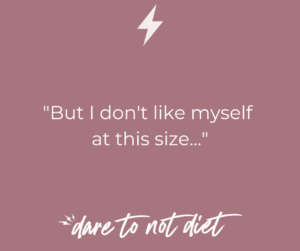
For some people, giving up dieting is easy. Dieters are “falling off the wagon” half the time anyway – this is just like falling off and just staying off. Dream come true, right? Never diet again!
But then the reality of why you dieted in the first place comes crashing through. “I’m still fat!” or “I’ll get fat again!” is a stark realization that breaks the reverie of your no-diet bliss. And if you’ve been living with the fantasy of getting thin, or maybe even the reality of being thin, through dieting, then you’re facing some serious shattered dreams.
So yes, body acceptance is a HUGE part of diet and ED recovery. But where to start?
I think the first thing anyone should know is that you did not learn to hate your body, or fat, in a vacuum. We live in a patriarchy that enforces beauty ideals as a way to keep women busy and unable to achieve real economic and political power. Think I’m kidding? Have you seen the stats on wage disparity and representation in government for women? You may have been very busy dieting and chasing after the false currency of beauty and not noticed, so I’m telling you now: many people benefit when women keep hating their bodies. The diet and beauty industries are great examples of this.
I understand that just knowing that isn’t enough, so I recommend immersing yourself in some of the fabulous work of the many fat activists out there. I’ll take you through my own personal body acceptance journey as an example of how to do this.
The first blog I stumbled across was Ragen Chastain’s fabulous Dances with Fat blog. I read it obsessively for months. I began to see the societal fat phobia that had shaped my life and caused me to keep dieting even when I was unhappy with my body as a thin person. I’ve met Ragen several times and she is just as awesome in person as she seems on her blog. (and she’s the guest of our latest podcast episode!)
I also happened to find the book Fat? So! by long-time fat activist Marilyn Wann. Marilyn is one of my early heroes and this book really set me straight about how I could start to feel good about my body no matter what size it ended up at. I also met Marilyn and I loved her. It’s some kind of amazing thing to get to meet your fat activist heroes and find out that they are truly good and cool people.
Along the way I tumbled down the fabulous rabbit hole of fat fashion blogs. I was like, “This is a thing? Fat fashion is a thing?!” I’m sad to say I’d never seen fat women proudly wearing beautiful fashion in such an unapologetic way. And the hilarious thing is, I thought the first fatshion blog I found was the only one! Turns out, no. There were many, and even more now than a few years ago (hell yeah body positivity!). There was something so incredibly liberating about seeing so many fat bodies portrayed so positively. A big first step for me, before I could totally accept my own fatness, was normalizing the fat bodies of others. Fashion was a great medium to help me do this because I like looking at pretty clothing.
From here I found other fat activist and body love gurus Jes Baker and Virgie Tovar. Get Jes’s book Things No One Will Tell Fat Girls and Virgie’s anthology Hot and Heavy: Fierce Fat Girls on Life, Love and Fashion. Follow their blogs and listen to the podcasts they guest on. They are the very embodiment of fat women living full and fully satisfying lives.
One of the reasons you’ve probably felt your own fat body isn’t fabulous is that we’re surrounded by media images of only one kind of body: thin. Here’s how to fix that: flood your social media feed with fat positive posts, pages and groups. They’re actually pretty easy to find. Most fat fashion bloggers have their own Facebook pages, so start there.
Finally, check out the work of Vivienne McMaster of Be Your Own Beloved. She has e-books and programs that will get you to explore self-compassion through self-portraiture. I took her course last year and it was not only fun but also instrumental in stomping out my inner critic.
And then, once you’ve immersed yourself in positive images of fat bodies, and you’re starting to see how your fat body is also awesome, realize this:
You are so much more than a body.
It’s important to come to peace with this body you’re in, but feeling pretty isn’t required. Physical beauty, however it’s defined by the society you’re in, isn’t important to the actual living of your life. You may think it is, and others may try to reinforce this, but in fact, it’s bullshit.
Your value as a human is more than your ability to fit into made-up societal beauty standards that were created to control us. We don’t need beauty standards and you are not an ornament for others to admire.
You are a person with a life to live, dreams to fulfill, gifts to give.
Subscribe and get my free guide:
Why you overeat …and what to do about it
Click here if you just want my newsletter!
Body Image
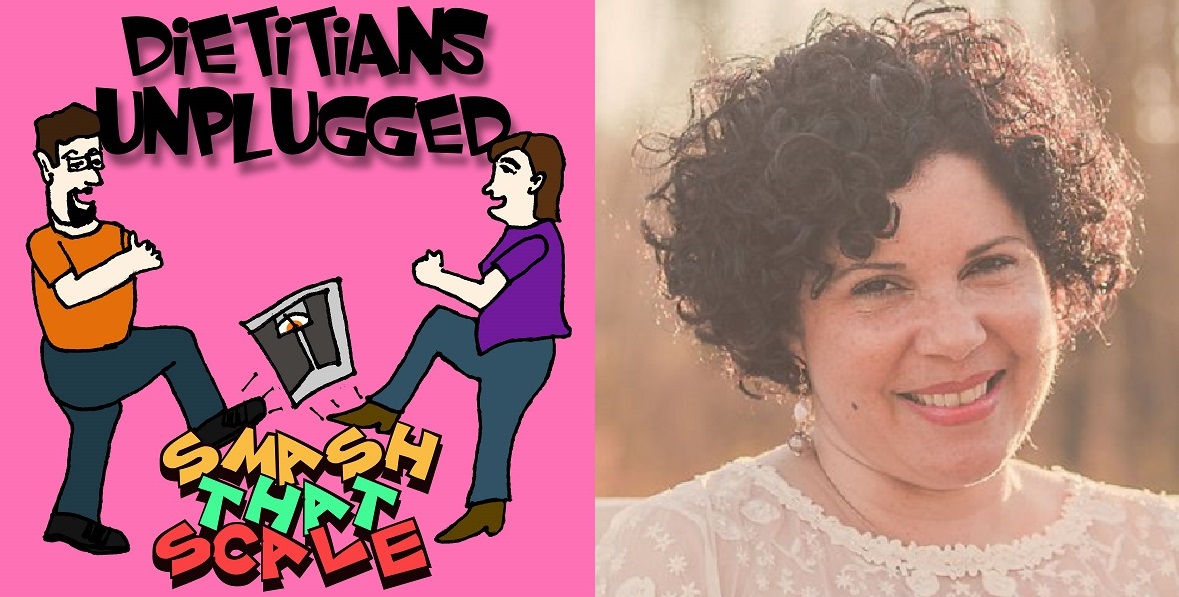
I have grey hair. Not a lot. Just some right now. There will in all likelihood be more down the road. This aging thing doesn’t go in reverse, Benjamin Button style.
When I was younger, I always thought I’d dye my hair. My grandmother did, until she was very old and couldn’t make it to the hairdresser anymore. My mother did too, until she got sick enough to no longer think about the dreaded roots (amazingly, only the last couple months of her life; and I think she still probably thought about her roots).
I thought there was no other option than to dye your hair because grey hair was simply to ghastly to be allowed to run unchecked on one’s head. If one’s head belonged to a female, at least.
Until one day I figured out there wasn’t just one option, which was to “hide” grey and pretend like it just wasn’t happening. If I no longer believed in societal beauty ideals, there were suddenly multiple options! I could let my hair get grey. I could shave it off. I could dye it not to hide it, but to bring attention to it, in unicorn pink-blue-purple! I could do whatever the fuck I wanted with it. That’s at least four more options right there.
I chose going grey, mostly because I’m lazy, but also because, as it came in, I kind of liked it. I liked it a lot, actually, once I decided that I’d see it as 1. simply another hair color that I was going to get to experience without having to do a lick of work 2. a way to buck patriarchal beauty rules that weren’t providing me with any real power, and 2. a symbol that I wasn’t afraid to get older — that in fact, I was going to own the hell out of getting older.
It hasn’t always been easy. As I dropped quickly and dramatically out of thin-and-acceptably-young-and-cute and deep into pudgy-grey-and-middle-aged, I noticed how people changed in reaction to me. Because I slipped out of the realm of fuckability in many people’s men’s eyes, it’s gotten harder to have my opinion heard around them. This would be a much bigger problem if I worked in a male-dominated profession, which thankfully I don’t anymore (frankly it was already hard enough to have my opinion heard by male co-workers and managers at any age); but not everyone has this luxury.
Anyway, I’ve thought about this stuff a lot as I’ve witnessed myself going from young-hot-mess (20s) to confused-but-getting-there (30s) to mature-and-on-a-mission (40s at the moment). I like me now better than me then. But that doesn’t mean I don’t still suffer the indignities of aging in a society that is distinctly anti-aging for women.
That’s why we got my friend and fellow middle-ager Michelle Vina-Baltsas on the line to chat with the Dietitians Unplugged. Aging affects our body image in a profound way, and it needs some processing. I hope you enjoy our conversation as much as we enjoyed having it.
Show notes: we referenced this awesome article a few times.
Listen on:
Subscribe and get my free guide:
Why you overeat …and what to do about it
Click here if you just want my newsletter!
Body Image

Aaron and I are kicking it solo (duo?) in this episode of ranty rantings about bad science around weight and health, celebrity weight loss pressure, and why we need our fat positive role models so damn badly. Some of my favorite Dietitians Unplugged podcast episodes are when Aaron and I get to catch each other up with what’s on our minds, and this is one of those times.
Listen on:
Subscribe and get my free guide:
Why you overeat …and what to do about it
Click here if you just want my newsletter!
Body Image
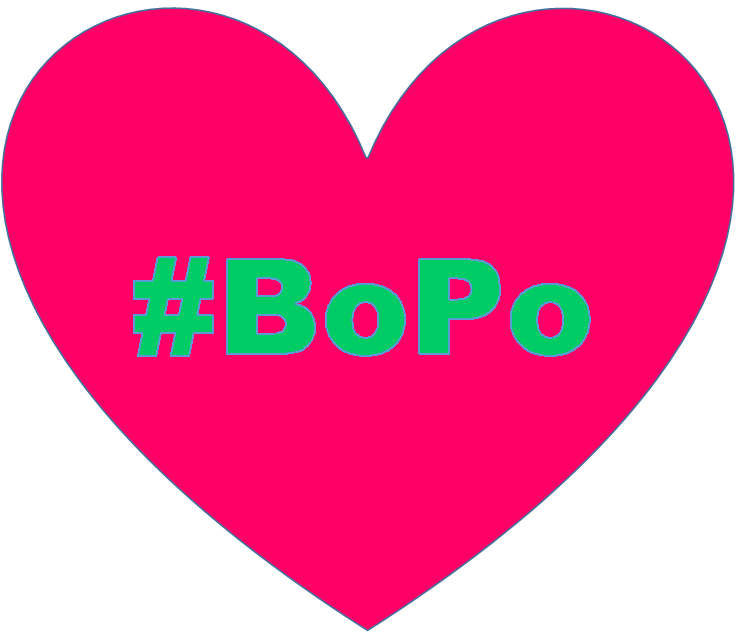 One of the things I’ve heard said recently is that thin or “normal” weight folks feel left out of the Body Positive movement.
One of the things I’ve heard said recently is that thin or “normal” weight folks feel left out of the Body Positive movement.
It totally sucks to feel left out.
Some feel that the body positive movement is too focused on fat bodies, and this feels alienating to those with thinner bodies. Because fat bodies are highly stigmatized in our society, they do get a lot of attention within the BoPo community because this is radically different from how they are treated outside the community.
So if you are not fat and feel left out of the Body Positive movement – you are not alone. I understand your need for the body positive community to be inclusive of all weights and shapes because body shame can affect someone of any size. You belong in the body positive movement as much as the next person.
But there is a reason why there is often a focus on larger bodies.
First, there is a difference in the way body shame is experienced by fat people and thin people. When you, the non-fat person, experience feelings of shame around your thin or “normal” sized body, you alone experience those feelings. You may feel that others are judging you, but in reality, your body still largely conforms to the expectations society has for women’s bodies: it is within an “acceptable” weight/size range, and is not deemed in any sense “overweight”, “obese” or “fat”. Dealing with feelings of intense body shame is no small feat and the body positive movement is important for you.
When you are fat and dealing with body shame, both you and society feel your body is not “right.” So you experience the double whammy of not feeling good about your body, and also society reaffirming that feeling through institutionalized, accepted weight bigotry. This is underscored most often in fat people’s visits to the doctor, where they often cannot get the same treatment for conditions as thin people do because all problems are blamed on their weight. That is a really big load of stigma to carry, not to mention life-threatening at times.
So, some things to know:
The Body Positive Movement is first and foremost a social justice movement. Body positivity used by individuals as nothing more than a personal tool to improve self-esteem is not the sole purpose of the movement. The Body Positive Movement is about dismantling systems of oppression that keep us in a state of body hatred. So while you can certainly be positive about your own body image in any way you want, Body Positivity, The Movement, hopes for more, for more people, and therefore requires more effort. (and if you’re wondering about how weight loss fits into this, I wrote about that here)
Thin people are not the only people feeling left out the body positive movement. Melissa Toler, Aaron and I talked about this problem on this podcast. The Body Positive Movement feels to many like it only includes the “right” kind of fat body: not too fat, hourglass, white, cis-gendered, symmetrical-faced, able-bodied, female. This is a huge problem for something that started out as a social justice movement to include all bodies as good bodies. ALL OF THEM.
We need to include all the shapes, sizes, colors, abilities and genders because it takes all of us to lift up not just ourselves but everyone else in need of lifting. So you can be thin in the BoPo Movement while still recognizing that some bodies are not treated equally in the world and therefore need more help in achieving this equality, and that you can help with this kind of advocacy. And there’s a whole lot of feel-good around doing that.
Also, if you are thin or “normal” weight/shape/size, I want to invite you to join the Fat Acceptance/Fat Positive movement.
Yes, really!
Why? Because we need you as allies. You’ll be helping to address a major civil liberties issue. And you may find that in helping to liberate other bodies, you’ll find some liberation for yourself as well.
You will be with people who are working on accepting themselves just as you are, while also trying to change the culture. We all lift each other up.
PS – just as I was putting the finishing touches on this post, I came across this brilliant article that says everything I’m trying to say here but SO much better.
Subscribe and get my free guide:
Why you overeat …and what to do about it
Click here if you just want my newsletter!
Body Image

A little while back, two of our listeners sent us variations on the question, “How do I get my significant other on board with my journey?” How do you articulate that you are stepping away from the world of diets and body shame and toward something more compassionate? And how do you do it if your partner is still very much in the world of diets? We enlisted our friend, therapist Hilary Kinavey of Be Nourished to help us answer the question. Take a listen!
Listen on:
Subscribe and get my free guide:
Why you overeat …and what to do about it
Click here if you just want my newsletter!
Body Image
 I’ve been waiting a while to write this post. Like, months. Because it’s a complex issue, and it deserved some thought. (Also, I figured I’d probably piss a few people off with my take on this, and I really needed some time to galvanize myself)
I’ve been waiting a while to write this post. Like, months. Because it’s a complex issue, and it deserved some thought. (Also, I figured I’d probably piss a few people off with my take on this, and I really needed some time to galvanize myself)
I think this question breaks further down into three questions:
- Is it body positive to want to lose weight?
- Is actively trying to lose weight a body positive act?
- If I happen to lose weight, am I no longer being body positive?
Let’s start with the first one:
1. Is it body positive to want to lose weight?
We live in a culture that reviles fat bodies, heavily endorses one type of beauty (thin, white), and insists that if you just work hard enough you can change whatever body you’re in and suddenly fit into the impossibly stringent beauty standards that have been set up for women (and now increasingly, men). With all this pressure bearing down on us, I see it as completely natural to still wish for thinness in order to fit into the mainstream so we can get all that love that society sends out for those who’ve made it.
So no, I don’t think it’s necessarily unbody positive to still have this desire for societal acceptance. We are geared to want to belong, which is why we humans have, for the most part, gelled into tribes and communities and civilizations. We’re also geared, in general, to strive, to move forward, to achieve (though this is not true for everyone nor should it have to be). And often we want all sorts of things that we might never get, even when that desire isn’t rational or achievable.
The problem with body positivity and weight loss is not the wanting, which stems from a society that tries to vilify or erase all sorts of bodies. The problem is with the actual attempting of weight loss. Which leads me to…
2. Is actively trying to lose weight a body positive act?
This is where it gets complicated.
Diet and weight loss culture is not body positive because it is rooted in the belief that fat bodies, bodies that do not conform to the very narrow beauty standards (thin, white, able-bodied, cis-gendered), are wrong, unattractive and/or unhealthy. Diet and weight loss culture simply does not respect the broad diversity of body weights and sizes that exist.
In addition to these nefarious underpinnings, dieting to lose weight simply isn’t sustainable, based on all the best available data (and for this data, you should read Traci Mann’s Secrets from the Eating Lab in which she reviewed all the most rigorous weight loss studies and discovered that…long-term weight loss doesn’t work). And when we say “diets don’t work,” what we mean is that they work for a little bit at first, and then, usually within three to five years, some, all or even more of the weight is regained for most people. Failure on this level is simply not a lack of motivation or willpower, and the diet industry is unable to show that long-term weight loss is achievable for more than a tiny fraction of people.
Weight loss for health is wholly unnecessary. Studies show that our health habits (balanced diet, fitness, not smoking, not drinking excessively, etc.) make more of an impact on our health and longevity than weight ever could. We can begin to work toward fitness and eating well at any weight. Weight loss may be associated with health improvements, but there are three problems with concluding that weight loss is the solution to health problems: 1. Studies that show this association rarely take into account the health habits that typically change when someone tries to lose weight, so we really don’t know if it is the weight loss itself OR the change in health habits that are affecting health. 2. We’ve seen from other studies that health improvements can be accomplished through change in health habits in the absence of weight loss (eg. Eating a more nutrient dense diet, exercising more, etc.), and 3. Since weight loss is typically short term, any improvements made to health based on weight loss alone may end up being short term as well.
Body positivity is founded on the belief that all bodies are good bodies and that a person’s value is not based on her/his body. Weight loss culture is founded on the belief that all bodies are better smaller. So no, participating in diet and weight loss culture is not, in my opinion, a body positive act.
Please know that I never blame or judge those who participate in diet and weight loss culture. They are victims of a society that profits from their insecurities. Keeping women busy with smallness keeps us from fully participating in society and therefore unable to change the rules to actually empower women; it also means we will buy whatever is offered to help us fit into this rejecting society, including weight loss “solutions.” Dieters are, by design, pawns of a $60 billion diet industry. But all of this is why an anti-fat-body culture is not body positive.
Allowing diet culture messages to highjack body positivity renders it just more of the same, and we are left with a culture that continues to insist that some bodies are good bodies, while others aren’t.
3. If I happen to lose weight, am I no longer being body positive?
Changes in body weight and/or size can occur for many reasons. Often a person’s body will change as they age. Sometimes bodies lose or gain weight with illness. Sometimes body size or weight changes can occur with improvements in diet, eating more intuitively, or increase in exercise. Change in diet or activity level is not a guarantee of weight loss, however weight loss may occur. Weight loss as a result of self-care is not inherently unbody-positive. It is simply something that happened while you were looking after yourself.
It’s important to remember that this loss may be temporary, or it may be permanent, but a focus on weight loss will eventually undermine attempts at sustainable self-care as we attempt to coax the body into a shape or weight that may not be natural for it. That is why Health at Every Size® is weight-neutral.
Focusing on caring for oneself in the best way possible while also learning to accept the inherent shape and size of your body is body positive. However, how the body responds weight-wise is better treated as a side-effect of self-care, not the focus.
These are, needless to say, my own opinions. I don’t own body positivity, I merely promote it. Also, it’s not a club where you can have your membership revoked if, heavens forbid, you do something unbody positive. It’s a movement that is trying to change the status quo of body hatred.
I did meet the woman who owns the body positive trademark, so if you want her take on it, her website is here. She didn’t trademark it for financial purposes, but to protect it from the diet world co-opting this term for profit, as we see happening now.
Recommended further reading: This is a great article by Virgie Tovar that further explains why body positive spaces need to be free of weight loss talk.
Subscribe and get my free guide:
Why you overeat …and what to do about it
Click here if you just want my newsletter!
Body Image
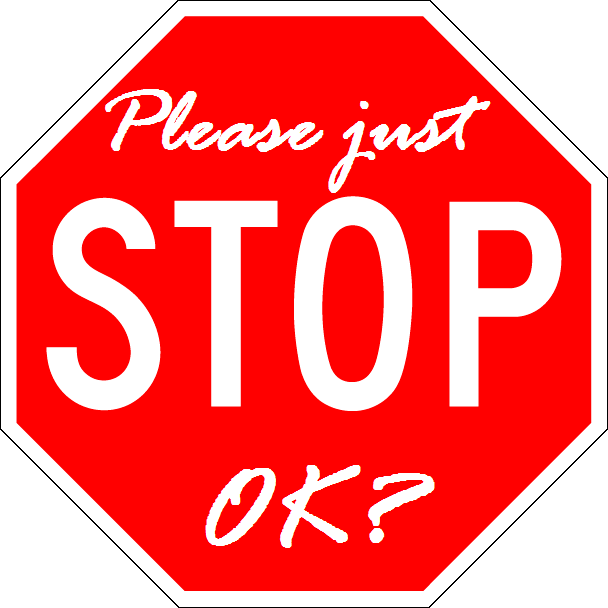 This weekend I saw this SELF magazine article on Oprah’s weight loss. So, I decided to write them a letter! I’m over magazines posing as advocates for female empowerment when they are just more of the same oppression.
This weekend I saw this SELF magazine article on Oprah’s weight loss. So, I decided to write them a letter! I’m over magazines posing as advocates for female empowerment when they are just more of the same oppression.
Dear SELF,
Your article on Oprah’s weight loss was disappointing, however not surprising.
Oprah has not found a permanent weight loss cure, she has simply found a new way to diet. And like the other 95% of people who attempt to lose weight in any way, she will most likely regain this weight in 3 to 5 years. If she manages to develop the eating-disorder-like tendencies that the few people who sustain weight loss beyond this time frame do, she may be slightly more successful, but her life will then revolve around her diet. Is this what we expect one of the world’s most successful women to be concentrating on? Her diet? This expectation is unacceptable for any woman.
The science on weight loss is now clear: all but a tiny fraction of people who attempt weight loss will regain some, all, or even more of the lost weight in 3 to 5 years after the initial weight loss is achieved. Even Weight Watchers, by their own data, cannot show better results. A weight loss-focused mindset drives the restriction/disinhibition cycle and does not yield significant long term weight loss or better health for most people.
I am a former SELF subscriber. I read your magazine faithfully in my most restrictive dieting days, and unfortunately, the weight loss-centered advice in your magazine aided and abetted my extreme disordered eating. Women don’t need to change their body shapes to achieve their best selves, but I know this is what sells magazines. The dangled carrot of a “better looking” or smaller body will always ensure you have subscribers. A focus on body appearance plays women small, though; it robs them of body autonomy and the time and energy to pursue real equality and power in society (Did you know women don’t have this yet? Surely you do.).
I’d like to invite SELF magazine to change it’s editorial focus from weight-centered to non-weight-and-body-appearance-centered. I’d like to invite you to take a truly feminist, body positive stance which does not include the promotion of weight loss or the adherence to cultural beauty standards (because why do we even need beauty standards? Are we not so much more than this?). We can have discussions about health that do not involve weight loss or our appearance. I’d like to invite you to embrace true size diversity by featuring, regularly, women of all shapes, sizes, colors and abilities in your magazine.
There are a growing number of us who refuse to any longer play the weight loss game, and have chosen a weight-neutral, non-diet path to health. We have been damaged by the diet industrial complex but refuse to let it rob of us true health and vitality any further. There is no magazine* for us.
Supporting the weight loss paradigm does not improve women’s lives. Oprah is not better because she’s smaller. Someone temporarily losing weight on Weight Watchers or any diet is not revolutionary, it’s more of the same. I hope you will decide to do better by women someday.
Glenys Oyston, RDN
Dare To Not Diet
If we want change, we are going to have to start demanding it, loudly, publicly, and all the time. It’s tiresome. I don’t want to do it, but I’m going to anyway. Will you join me?
*Except one magazine!
Subscribe and get my free guide:
Why you overeat …and what to do about it
Click here if you just want my newsletter!